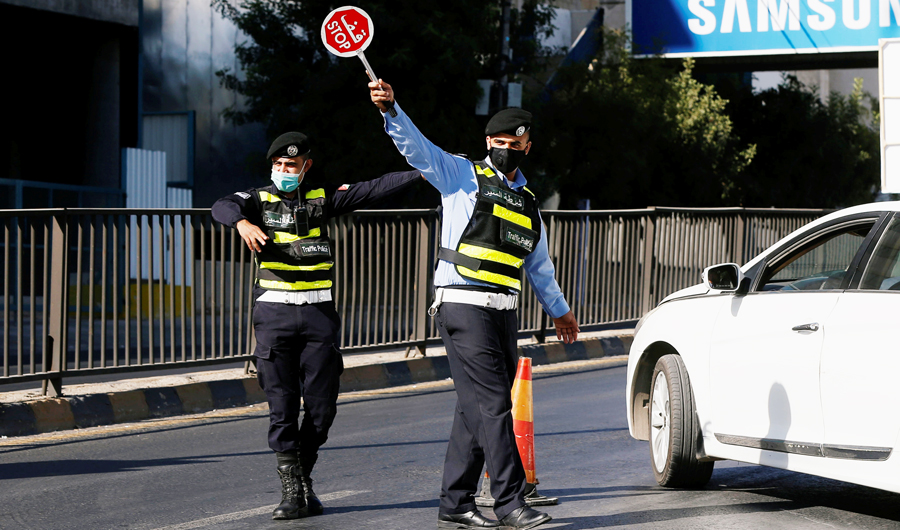BEIRUT: Thousands of Lebanese protesters marked the one-year anniversary of nationwide demonstrations on Saturday by marching from Martyrs’ Square in the heart of Beirut to the central bank and government offices where they renewed calls for an end to Lebanon’s sectarian political system.
Activist groups from the southern cities of Sidon and Tyre, as well as Baalbeck, Bekaa and Tripoli in the north, joined the protest, which brought Martyrs’ Square back to life after weeks of inactivity. Wearing masks, the protesters waved Lebanese flags and demanded the overthrow of the “criminal” ruling class.
The march continued to Beirut port, where protesters lit a “torch of the Oct. 17 revolution” to commemorate victims of the explosion that devastated large areas of the capital on Aug. 4.
Almost 180 people were killed and more than 6,500 injured in the blast, which left Lebanon reeling after a year of financial scandals and political stalemate.
In that time, the country has plunged into bankruptcy, the Lebanese lira has collapsed and the dollar exchange rate has skyrocketed on the black market.
Tens of thousands of people have lost their jobs, and more than 20 percent of companies and institutions have closed their doors. Meanwhile, the poverty rate has soared from 28 percent to 55 percent, with some indicators predicting it will reach 75 percent.
The central bank’s reserves have dropped from $30 billion to $17 billion and the gross domestic product from $55 billion to $31 billion. Inflation has reached 100 percent.
Amid mounting popular anger at the country’s political class, Saad Hariri’s government resigned, Hassan Diab’s government quit after the Beirut blast and Mustafa Adib stepped down after failing to form a government in line with a French rescue initiative led by President Emmanuel Macron.
Hariri recently offered himself as a “natural candidate” to head the new government, but President Michel Aoun postponed parliamentary consultations after the Free Patriotic Movement objected to the appointment.
Amid these dramatic developments, protesters say they have no intention of backing down.
“Our positions have not changed,” activist Mahmoud Faqih told Arab News.
“The recent developments have made it even clearer that the ruling class has lost legitimacy and must be removed from power. We have proven that we are the alternative power to heal the wounds of the people.”
SPEEDREAD
Almost 180 people were killed and more than 6,500 injured in the blast, which left Lebanon reeling after a year of financial scandals and political stalemate.
Faqih said the coronavirus pandemic has slowed the revolution’s momentum, which has also been affected by “many active protesters deciding to leave Lebanon.”
However, “during the past year, initiatives have taken place between revolutionary groups to increase coordination and establish an opposition front,” he said.
Another activist, Ziad Abdel Samad, said: “This year has shown that our rulers are criminals who commit crimes against their own people. The ruling class has lost all legitimacy in their people’s eyes.”
He said that “frustration and desperation” had forced many activists to leave the country.
“Nothing has changed. The ruling class is still fighting over the quota system, even in light of the French initiative.”
However, Abdel Samad said that the creation of opposing political blocs in the wake of the protests might lead to the “emergence of new alternative officials.”
“The revolution has created a new equation on the political scene. On its one-year anniversary, the revolution is still getting foreign support.”
Meanwhile, US Secretary of State Mike Pompeo tweeted: “One year ago today, the Lebanese people began taking to the streets demanding reforms, better governance and an end to the endemic corruption that has stifled Lebanon’s tremendous potential. Their message remains clear and undeniable — business as usual is unacceptable.”
The UN Special Coordinator for Lebanon, Jan Kubis, said that he “stood beside Lebanon and its people, and the necessary reforms that should be carried out by an effective government.”
Kubis said that “the massive wave of protests brought to the streets hundreds of thousands, and even millions, of Lebanese across all the Lebanese regions and across political and sectarian divides to express their profound disappointment in the ruling class and the sectarian political and administrative system that has promoted corruption and nepotism in the country.”






